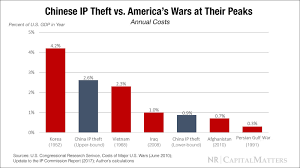Part two of a two-part series.
Theft of intellectual property. While its COVID-19 vaccines are ineffective, China has otherwise made great technological progress. But it has achieved that status by stealing America’s intellectual property.
A 2017 report by the National Bureau of Asian Research estimated the annual cost of China’s intellectual property theft to the U.S. economy “continues to exceed $225 billion in counterfeit goods, pirated software, and theft of trade secrets and could be as high as $600 billion.”
A U.S. Department of Justice report to the Senate Intelligence Committee claimed that “from 2011-2018, more than 90% of cases alleging economic espionage by or to benefit a state involve China,” Forbes reported, “and more than two-thirds of the Department’s theft of trade secrets cases have had a nexus to China.”
In response, Chinese courts are granting anti-suit injunctions blocking foreign companies from taking legal action anywhere in the world to protect their trade secrets.
When China’s not stealing our intellectual property, it’s sabotaging it with malware or hacking our systems.
For example, telecommunications and consumer electronics equipment from Huawei Technologies Co. has been banned by the U.S. and other countries, because it is believed to include backdoors that enable the Chinese government to spy on users. Huawei has also been accused of fraud, intellectual property theft and involvement with China’s “re-education” camps for Uighur Muslims.
China also steals research from American universities and has established “talent programs” to identify and recruit people who can steal technology for China.
Meanwhile, China recently tightened control over China’s businesses, wiping out more than $1.2 trillion in market value, “as Chinese authorities slap companies with fines, ban apps from stores and demand that some firms completely overhaul their businesses.” This action has been costly to American investors who have invested their hard-earned capital into Chinese businesses.
In China, there can be no free enterprise, because there is no freedom.
Dodging audits. It’s ironic that the CCP rules Chinese citizens with an iron fist, yet it flagrantly violates laws for its own benefit. One example is the refusal of Chinese companies to allow U.S. regulators to inspect their auditing process.
The U.S. is planning to delist Chinese companies from American stock exchanges in 2024, unless the CCP and Chinese companies comply with laws requiring inspection of their auditing process by U.S. regulators.
Giving Chinese companies, which are either owned or controlled by the CCP, an advantage over American companies is unacceptable.
That’s why the U.S. Congress, in a rare unanimous vote, passed the Holding Foreign Companies Accountable Act, which was signed into law by President Trump to prohibit U.S. trading of foreign company stocks unless the Public Company Accounting Oversight Board is allowed to oversee the companies’ audits.
The law applies to all foreign companies, but is directed at China, the only country that has failed to reach an agreement with U.S. regulators allowing the audit process that was required by the 2002 Sarbanes-Oxley Act.
Other Chinese Atrocities
Like other Communist countries, China is a dictatorship. The lure of communism is that it supposedly creates equality, but that’s never been the case. The average Chinese citizen earns $10,410 a year. Yet China’s president is a billionaire. Where’s the “equality” in that?
The Chinese government has created concentration camps for an estimated one million Uighur Muslims. It harvests the organs of Falun Gong prisoners of conscience and others, and it tortures and murders innocent people. China created the world’s largest and most sophisticated online censorship operation.
China is not just seeking to be a world power. It is seeking to control the world. Hong Kong used to lead the Index of Economic Freedom. Now it is a colony of communist China. China is also increasingly aggressive toward Taiwan, which many fear could share a similar fate.
China has even dredged areas of the South China Sea and created islands that it uses as military bases for Chinese fighter jets. It has also developed 3,000 miles of underground tunnels that are used to store and hide an arsenal of 3,000 nuclear warheads.
Doing business with China may be necessary today, but it is also immoral. And it may prove to be costly. If China is taking away the freedom of the successful companies that are boosting its economy, what is it likely to do to the U.S. companies that depend on China for business?
